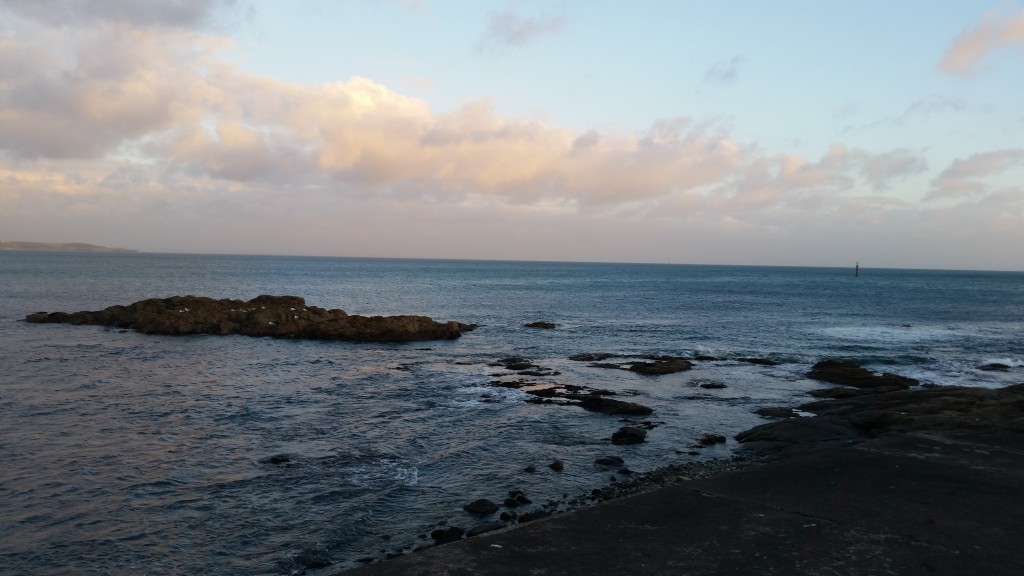As I continues my adventure through Cornwall, I had the opportunity to indulge in an authentic Cornish Pasty.
We asked around here in Cornwall about the best local pasty shops. Most votes were for Philps in Hayle. They have a branch in Marazion so we bought steak and potato and rutabago and onion ones there and ate them on a bench looking across to Mt. Michael’s Mount. Delicious and exciting!
By popular demand, I have a recipe for you that will satisfy your cravings for this delicious creation!
This recipe is from Pamela Season Walker. She perfected her cooking skills at the famous Cordon Bleu school near London. However, she is not Cornish. Despite this handicap I can vouch that she bakes an excellent and authentic pasty. The right pastry is all important; soft enough to bite into, tough enough stand up to handling. She writes:
 The very best pastry for Cornish Pasties is made with half LARD and half BUTTER.
The very best pastry for Cornish Pasties is made with half LARD and half BUTTER.
The circle of pastry was usually cut with a dinner plate, so it was large enough for the miners, hay makers or harvest reapers to have several bites from it during the day and not eat it all for one meal. Initials were cut into the pasty at one end so the owner would know it was theirs. Nowadays they are usually made smaller, even large bite size (dice the meat and vegetables much smaller).
Some Cornish cooks prefer to put finely chopped or grated fats into the flour with the water as this makes the pasty more elastic and manageable. But rubbing the fat into the flour is the usual way to do it.
The exact amount of water depends on the type of flour and even the humidity, so this comes with experience. It is preferable to have the fats really cold and hard. They can even be put in the freezer for a while and then grated into the flour.
Pasty Pastry
1 lb (450g) white flour
4 oz (100g) lard or equivalent shortening
4 oz (100g) butter
5-7 oz (175 ml) cold water
Chop or rub fat into flour.
Add water (a little less than the total amount) and mix with flour and fat mixture until it is all absorbed by the water, but not wet.
Knead lightly until it forms a ball.
Wrap and leave in fridge for 1/2 hour (or longer until ready to use).
Traditional Filing (for one large pasty):
4 oz (100g) lean beef cut into small cubes (Chuck steak, top round, flank)
2 oz (50g) onion or shallot diced (more could be added for onion lovers)
6 oz (150g) potatoes cut into small pieces
3 oz (75g) rutabaga or turnip diced (optional according to taste)
Salt and pepper
Roll out pastry to about 1/4 inch thick and cut to desired size.
Place some potato in a line along middle of circle, leaving the edges empty.
Place some onions and rutabaga (turnip) over potatoes.
Place the meat over the vegetables.
Season well with salt and pepper.
Add a few drops of water for moistness.
I egg well beaten for sealing edges and glazing.
Brush edges of circle with egg.
Join the long sides of the circle across the top over the meat and vegetables,
pressing the pastry together gently. Then fold edge from one end over and over till you reach the far end (curling the edges like a wave). The finished edge looks like a rope.
Place on well greased baking sheet or oiled parchment paper.
Brush with egg mixture.
Bake in 400*F oven for 15 minutes.
Turn oven down to 350*F and continue baking for 30 minutes.
Enjoy! Great for outdoor summer parties and picnics. The pasties can be wrapped in a towel and will hold their heat for about an hour. Delicious served with cider or scrumpy (rough cider).
There are many variations on the fillings:
Chopped parsley or Herbs of Provence
Garlic
Leeks
Peas
Pork, sausage, chicken
Vegetarian
If using Gluten Free flour I would suggest using egg in the mixture to help bind the pastry.





